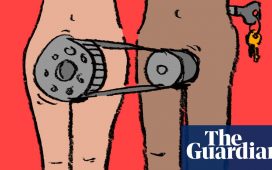People often ask me about how you make opera “relevant” to a young audience. It’s not a question I like much. When I was a child, I hated it when adults spoke or behaved differently towards me because of my age. Adults talk down to young people all the time, and I don’t know where they get the nerve. In fact, one of the first performances of Dido and Aeneas was at Josias Priest’s school for girls in London – and that was in 1689. So the question seems a bit out of date. My view is: if you like opera, why wouldn’t a young person like it just the same?
I first heard Dido and Aeneas when I was 11. There was a production of it at my school. One of the sixth form sung Dido, younger girls made up the chorus. I wasn’t involved myself, but I loved it, and afterwards I listened to it so much on tape (tape!) that I could more or less sing every word from memory. So this opera has always felt like an old friend – but I wouldn’t call myself an opera person. I maybe went once or twice with school, but other than that not at all.
But Dido did stay with me. Years later, I was on my way to work – as artistic director of the Unicorn, and I was listening to it on headphones on the tube – not a tape, this time – when I suddenly had an idea for how one could do one of its middle scenes. I got excited, and started thinking about how one might do the whole thing. Nothing concrete, just starting to imagine what a staging might look like. I usually think about a piece of work for a very, very long time before I start working on it practically, and I reckon I probably brewed Dido for at least a year and a half before I even mentioned it to anyone.

Daniel Kramer had just taken over at English National Opera as their artistic director, and he and I started a conversation in the street one night. I’ve always wanted to do Dido, I told him. Come pitch to me, he said. So I did, and he said yes. We always knew we wanted to stage it at the Unicorn, but the Unicorn theatre isn’t an opera house, and we initially didn’t know how we’d be able to bring together either the musical expertise or the number of people involved to stage something like this. Daniel and ENO as co-producers made that possible.
In a nutshell, ENO has been responsible for the music, and the Unicorn has taken charge of the staging and technical aspects of the show, though obviously it’s important not to think of them as separate. I love watching what the conductor, Valentina Peleggi, can achieve in rehearsal. We’re enjoying figuring out together what this piece can be.
I’ve always really liked baroque music: it feels both very truthful and very heightened all at once. I like to play with artifice in my work, and play with whether things are real or illusory. In a theatre, there are lots of different ways in which you can make something seem real – but often the workings are hidden. I like playing with showing you how we do things rather than pretending they just happen, because I think that creates a paradox which can draw an audience further into a moment – even if it also keeps them at a distance. That’s what I think baroque music does – by keeping you slightly at bay, it draws you in further. And the music in Dido is completely sublime. The story’s a bit flimsy, which happens in a lot of operas. The more important thing is that the emotions be true, and that’s what we’re going for in this staging.
I didn’t want to “make the opera relevant” but I was interested in whether a different perspective might chime with the audience we’re expecting. I started thinking about the way in which a lot of teenagers support their parents’ emotional lives – particularly where parents are single parents, I think it often happens that a child becomes a confidant and friend as well. This gave me an idea for how to approach Dido – an idea I stole, to be honest, from a Belgian director called Wouter Van Looy – in which the character Belinda (who is a lady-in-waiting in the original score) could perhaps be seen as Dido’s daughter. Most of us don’t have ladies in waiting, but we do all have families of one kind or another, so by looking at Belinda in this way Dido also becomes the story of a single parent who makes bad relationship choices. I felt that was something that young people could probably connect with, though we don’t ever state explicitly that’s who Belinda is.

The new production also aims to plainly show its audience the workings of what we’re doing. Unlike conventional opera houses, our musicians are on stage, you can see everything they do. If a scene is set up, it’s set up by the chorus. If some furniture has to be moved, it’s moved by the singers. It’s a short opera, and we’ve only cut one section, not to make anything “easier” but because we all wanted to move forward to the ending. What we are interested in, essentially, is here are 23 people: a conductor, the musicians, the principles, the chorus, who have come together in this space – we are always in SE1 – and what these people can do, if they put their minds together, is put on an opera for you.
What I find so extraordinary about Purcell’s work, opera, and art in general: that humans have done these things and that it is about being human. And that’s what we’re hoping to share.
• Dido is at the Unicorn theatre, London, from 11 May–2 June.














